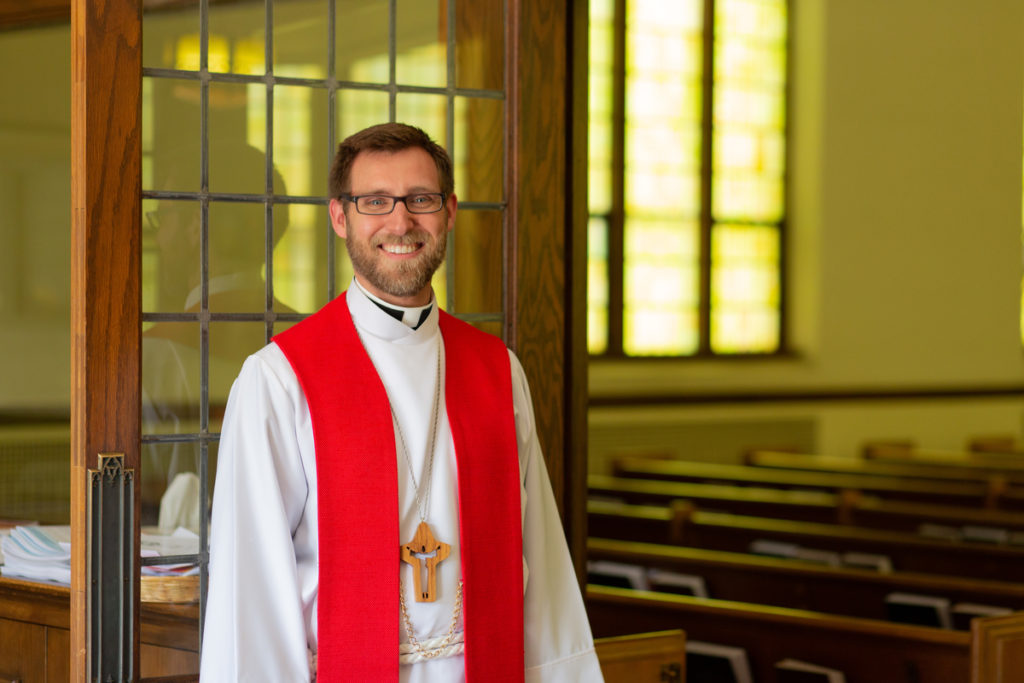RUNAWAY TRAIN
A pastor colleague recently wrote to me regarding the ELCA – “The question remains as to whether this progressive freight train has any brakes at all.” I replied, “Absolutely not. The ELCA has no brakes and feels no need for brakes. The ELCA is bound and determined to go – at an ever-increasing speed – in the direction in which it is going – no matter what.
The ELCA reminds me of the 1976 film “Silver Streak.” Gene Wilder and Richard Pryor star in this story of a murder on a train traveling from Los Angeles to Chicago. After the engineer is killed and a toolbox is placed on the dead-man switch to keep the engine running, the Silver Streak becomes a runaway train. The back part of the train is uncoupled in an effort to trigger the brakes, but the front part retains enough momentum due to the locomotive’s being at high throttle. The film ends with the Silver Streak’s roaring into Chicago’s Central Station (is the city of location mere coincidence?), destroying everything in its path until the brakes finally take hold.
With the appointing of a Commission for a Renewed Lutheran Church (CRLC), combined with the recommendations of the DEIA (Diversity, Equity, Inclusion, and Accessibility) audit which the ELCA spent who knows how much money on, the ELCA is like a runaway train.
An article by ELCA pastor Kevin Haug in the March issue of CORE Voice will tell more about the DEIA audit and what pastors, lay leaders, and congregations can expect. Here I will present my review of the latest report from the Commission for a Renewed Lutheran Church. I will be analyzing the Summary statement from the Commission’s November 30-December 2 in person meeting. A copy of that Summary can be found HERE.
I would like to begin by thanking ELCA pastor Ryan Cordle for his article regarding Critical Race Theory and the Commission. A link to his article, which appeared in the January issue of CORE Voice, can be found HERE. What he wrote helped me tremendously in formulating and clarifying my thinking.
On January 16 the ELCA’s Grand Canyon Synod (the synod in which I am rostered) hosted a Listening Session where two members of the Commission gave a summary of their work followed by an opportunity for those attending to share concerns and ask questions. During the session I made the comment that based upon the language of the resolution from the 2022 Churchwide Assembly which directed the Church Council to create the Commission and upon the fact that twenty percent of the members of the Commission – seven out of thirty-five – are Diversity, Equity, and Inclusion leaders and/or officers at their place of employment and/or influence, I am convinced that the purpose and intent in creating the Commission is to re-structure the church according to the principles of critical race theory and diversity, equity, and inclusion ideology. I was told by one of the members of the Commission that there is no pre-determined outcome for the work of the Commission.
After reviewing the summary of the November 30-December 2 meeting of the Commission, which is available on the ELCA website, I then wrote to the two members of the Commission, stating that I did not see how they could make the claim that there is no pre-determined outcome. I included the Bishop of my Synod among those who received my email. After thanking them for providing the Listening Session, I wrote, “I would say that the resolution that led to the formation of the Commission as well as the summary of the meeting of the Commission are literally saturated with critical race theory and diversity, equity, and inclusion ideology.”
I then wrote the following to support my point.
* * * * * *
I will begin with the resolution. This resolution includes the words, “being particularly attentive to our shared commitment to dismantle racism.” Those are very significant words. They reflect the position that racism is not just something that some people think and do. Rather imbedded into the very nature of our society are structures that privilege and empower certain races (white people) and disempower, victimize, and marginalize all other races (BIPOC people). The ELCA is therefore saying that it is not enough to just be non-racist – to not use racist language. We must be anti-racist. We must break down the structures that empower some and dis-empower everyone else. The report of the “Dismantling Racism” internal committee on Day 1 takes this concept even further. According to that committee, it is important that all of the work of the Commission “is completed through an intersectional lens of dismantling racism.” Those also are very significant words. According to the concept of intersectionality, the various systems that privilege and empower some and victimize and disempower everyone else are so intertwined and interconnected that all of these systems need to be dismantled, whether they be white supremacy, male dominance, agism, sexism, ableism, homophobia, transphobia, xenophobia, heteronormativity, or whatever.
The only specific instruction that has been given to the Commission is to “dismantle racism.” Nothing else is of prime importance. The new church is to be structured not first and foremost so as to position it to fulfill the Great Commission. Rather it is to be structured first and foremost so as to position it to dismantle racism – as well as every other system of oppression that is interconnected with racism. The summary of the three-day meeting shows how this top priority of dismantling racism is being pursued and implemented.
- On Day 1 Judith Roberts presented on the Diversity, Equity, and Inclusion Status survey responses from all ELCA synods. I did not see any other area where responses were sought for and/or obtained from all synods.
- On Day 1 the Commission “voted on and passed language that clarifies the mandate of the CRLC as being focused on governance.” At the Listening Session that I attended several people expressed deep concern for their congregation’s long-term viability. You did say that the focus of the Commission is on governance. I wonder how many members of ELCA congregations, once they hear and understand that, will feel that the ELCA is not concerned about the issues that are important to them.
- On Day 1 the “Why and What” internal committee reviewed the completed DEIA (Diversity, Equity, Inclusion, Accessibility) audit and discussed “how the recommended edits affect the current purpose statements.” Again, as with the DEI status survey responses from all synods, no other survey responses were solicited and received and no other audit was completed. All of which shows what is important and what is not.
- I have already mentioned the great significance of the “intersectional lens of dismantling racism” language of the report from the “Dismantling Racism” internal committee on Day 1. This same committee has also analyzed “how racism is embedded within the current structures of the ELCA.” If systemic racism needs to be dismantled – along with all the other systems of oppression that are interconnected with systemic racism – and systemic racism exists throughout the ELCA, then we should not be surprised if in the end the Commission will recommend dismantling the entire ELCA.
- On Day 2 Judith Roberts was back to present the executive summary from the Task Force for Strategic Authentic Diversity. With all that is being said, I assume that the belief is that Strategic Authentic Diversity will never be achieved by the method that the ELCA has been using from the beginning – having and requiring quotas. Rather Strategic Authentic Diversity will be achieved only by dismantling all interconnected systems of power imbalance and oppression.
- On Day 2 three people presented on the ELCA Churchwide Office’s Diversity, Equity, Inclusion, and Accessibility audit. As I remember from the Listening Session, the ELCA is so proud of itself for being the first of its kind of organization to complete a Diversity, Equity, Inclusion, and Accessibility audit.
- On Day 2 Vance Blackfox’s presentation on marginalized leadership movements and racial equity in the ELCA again shows the concerns, values, and priorities of the Commission.
So what are we to make of all of this? I can see only one possible conclusion. There is a pre-determined outcome to the work of the Commission – and that is to create a whole new church that will be structured according to the principles of critical race theory and diversity, equity, and inclusion ideology. The Commission has been appointed to create a whole new church that will be positioned not to fulfill the Great Commission but to be in the forefront of a massive cultural movement to create a whole new society based upon (dare I say it?) Marxist ideology.
* * * * * *
I then ended by thanking them for hearing my concerns. I sent this email on Friday, January 26. I have received a very gracious response from my bishop. As of February 4 – nine days after sending the email – I have heard nothing from the members of the Commission – not even the courtesy of an email like, “Thank you for attending the Listening Session and sharing your concerns.”
* * * * * * *
VIDEO MINISTRIES
“THE BLACKWELL COMPANION TO NATURAL THEOLOGY”
Many thanks to Ken Coughlan, Media Director, Director of International Programs, and Staff Counsel for Trinity Lutheran Church and School in Joppa, Maryland (NALC) for his review of The Blackwell Companion to Natural Theology, edited by William Lane Craig and J.P. Moreland. A link to Ken’s video review can be found HERE. A link to our You Tube channel, which contains reviews of nearly three dozen books as well as a dozen CORE Convictions videos on various topics related to the Christian faith and life, can be found HERE.
According to Ken, this volume is an almost 700-page collection of essays from the brightest minds in the field on the subject. However, for any Lutheran the first question we have to answer is whether Natural Theology has a place in the Lutheran tradition in light of Luther’s views on the limitations of human reason.
In this review, Christian apologist Ken Coughlan first gives a brief outline of the specifically Lutheran question to help you decide whether further exploration of the book is in line with your theological convictions. He then describes the book’s approach as a whole and gives a summary of the pros and cons for particular audiences. This work is not for everyone, but it can be a valuable resource for its intended audience.
For more material from Ken, please check out his website – kencoughlan.org
* * * * * *
May the Lord bless you as you begin your Lenten journey.
Dennis D. Nelson
Executive Director Lutheran Core




















The runaway train analogy is interesting. I would encourage all who are considering staying in the ELCA to remember Bonhoeffer’s quote: If a rain is going the wrong direction, it does no good to run as fast as you can down the aisle in other direction..” have to get off the train, esp one like this heading for a wreck
Absolutely with you!
Ready to jump.
As always, your vigor and analysis, helps us understand the contemporary realties of Eph. 6:12.
Thank you for your good words. You are absolutely correct that this is a spiritual battle.
Leaving the ELCA was the best choice for my family because a runaway train takes everyone with it.
May the Lord continue to watch over you and your family.